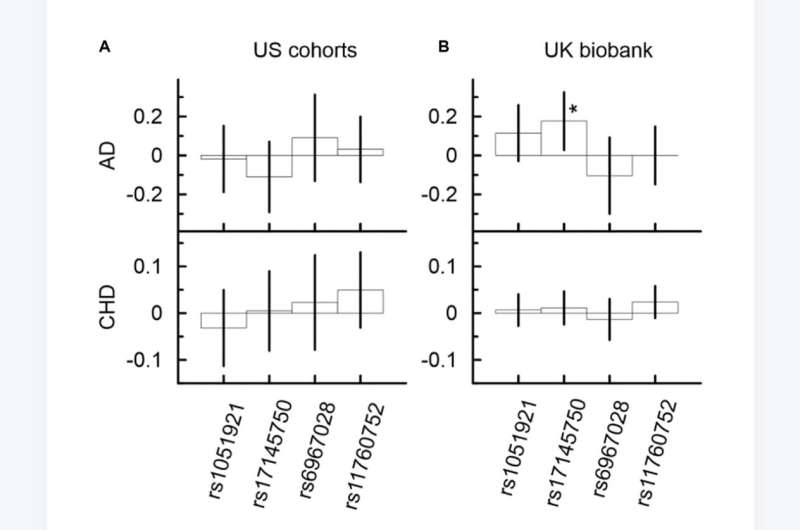This article has been reviewed according to Science X's editorial process and policies. Editors have highlighted the following attributes while ensuring the content's credibility:
fact-checked
proofread
Study: External factors shape genetic predisposition to lipids, Alzheimer's and heart disease in MLXIPL gene

A new research paper titled "Exogenous exposures shape genetic predisposition to lipids, Alzheimer's, and coronary heart disease in the MLXIPL gene locus" has been published in Aging.
In this new study, researchers from Duke University, University of Pittsburgh and Washington University School of Medicine examined associations of single nucleotide polymorphisms (SNPs) of the MLXIPL lipid gene with Alzheimer's (AD) and coronary heart disease (CHD) and potentially causal mediation effects of their risk factors, high-density lipoprotein cholesterol (HDL-C) and triglycerides (TG) in two samples of European ancestry from the United States (US) (22,712 individuals; 587/2,608 AD/CHD cases) and the United Kingdom Biobank (UKB) (232,341 individuals; 809/15,269 AD/CHD cases).
The researchers posit, "Our results suggest that these associations can be regulated by several biological mechanisms and shaped by exogenous exposures."
Two patterns of associations (represented by rs17145750 and rs6967028) were identified. Minor alleles of rs17145750 and rs6967028 demonstrated primary (secondary) association with high TG (lower HDL-C) and high HDL-C (lower TG) levels, respectively. The primary association explained ~50% of the secondary one suggesting partly independent mechanisms of TG and HDL-C regulation. The magnitude of the association of rs17145750 with HDL-C was significantly higher in the US vs. UKB sample and likely related to differences in exogenous exposures in the two countries. rs17145750 demonstrated a significant detrimental indirect effect through TG on AD risk in the UKB only (βIE = 0.015, pIE = 1.9 × 10−3), which suggests protective effects of high TG levels against AD, likely shaped by exogenous exposures.
Additionally, rs17145750 demonstrated significant protective indirect effects through TG and HDL-C in the associations with CHD in both samples. In contrast, rs6967028 demonstrated an adverse mediation effect through HDL-C on CHD risk in the US sample only (βIE = 0.019, pIE = 8.6 × 10−4). This tradeoff suggests different roles of triglyceride mediated mechanisms in the pathogenesis of AD and CHD.
The researchers conclude, "Finally, the results of this study suggest that genetic associations of SNPs from the MLXIPL gene locus with lipids, AD, and CHD are shaped by exogenous exposures. Further study of the related biological mechanisms can help to elucidate the related, modifiable risk factors."
More information: Yury Loika et al, Exogenous exposures shape genetic predisposition to lipids, Alzheimer's, and coronary heart disease in the MLXIPL gene locus, Aging (2023). DOI: 10.18632/aging.204665
















